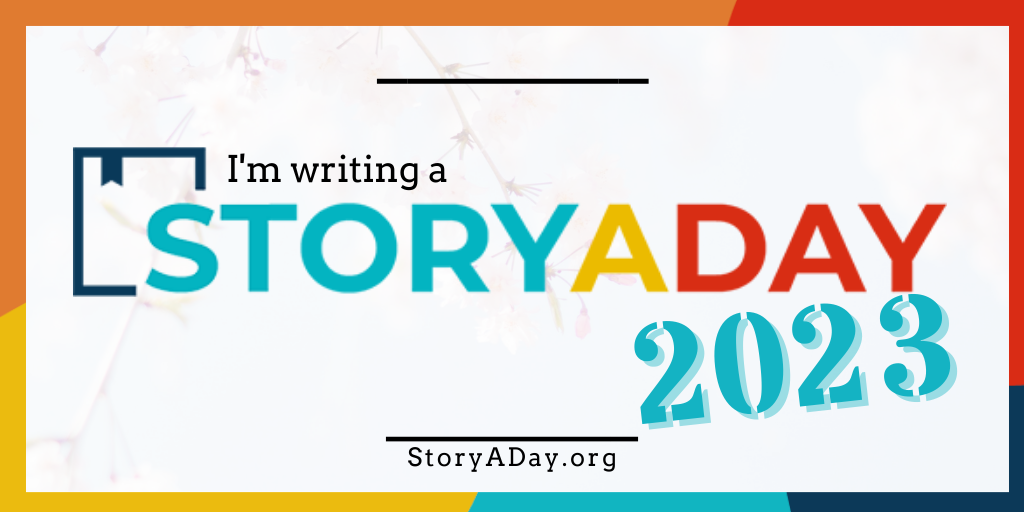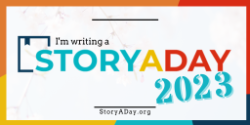StoryADay May is just around the corner!
Here are your graphics for 2023




Save these images and use them anywhere you post about your StoryADay May progress!
StoryADay May is just around the corner!
Here are your graphics for 2023




In this video post I talk about how shame shuts down the exact processes we need for creativity and what you can do about it.
Spoiler alert: I talk about reducing your expectations, celebrating every single tiny thing you do that contributes to your writing life, and collecting Story Sparks.
Writing a character sketch can be a great idea…as long as that’s not the way we introduce the character in the final story…
After our first proper date, the boy who had taken me to the theater sat across from me in a smoky pub in Edinburgh and told me stories from his life.
We had somehow managed to claim the coveted armchairs near the fire (because pubs in Scotland have such things). As we talked, one or other of us would lean forward to pick up our pint glasses from the low table in front of us. Gradually, we started to do it in unison.
It would have been noisy and it must have grown dark while we talked, but I don’t remember any of that, because I was laughing, and listening, and piecing together a person from the stories he was telling me.
He told me about his boss at the university, the stupid games they played in the lab to pass the time while experiments ran, the (very) daft things he’d done after too many pints, and – and this is where I remember thinking ‘you should careful with this one’s heart’ – the story of an ex-girlfriend or two.
It wasn’t until much, much later that I learned about his hometown, the granny he loved, the games he invented alone in his room on rainy Saturday afternoons.
I learned about him backwards.
It’s how we meet most people, if you think about it.
And yet we tend to make a fuss when stories are deliberately written that way, as if the author is somehow breaking the rules.
When we make character sketches and biographies, it makes sense for us to start at the beginning (where were they born? Where did they grow up? What formative experiences did they have?)
But if we try to do that when we introduce them to readers it feel like an info-dump…because that’s not how we get to know people in real life.
It feels stilted. Awkward. Weird.
So don’t be afraid to introduce characters in the moment and gradually peel back the layers gradually, and only when it becomes important for us to know why they are the way they are.
How do you think about character development vs introducing characters on the page? Leave a comment:
It’s really nice to know that there is still an outlet or a form of writing that I can do and still keep a full-time job while doing it.
And it didn’t really bend my schedule too much. So that’s how I really started exploring Flash
-K. B. Carle
In the second part of my conversation with author KB Carle (listen to Part 1 here) we talk about what attracted her to Flash Fiction; the challenges of moving from short to novel-length fiction; how to get unstuck ; and how being a writer includes building your community
There’s a ton of practical tips (and resources) to keep you going in this week’s episode. Enjoy!
Need the transcript? Click here
In Exchange for the Final Pudding Cup, We Offer Our Inner Thoughts, from The Offing (includes a Venn diagram)
Hello, My Name Is Marley in CRAFT Literary Magazine (this one has a word search!)
Vagabond Mannequin in Jellyfish Review (crossword clues as story!)
How We Survived , in Lost Balloon
Grace Q. Song‘s website
I Keep My Exoskeleton To Myself by M. Crane
Keep writing,
Julie
K.B. Carle lives and writes outside of Philadelphia, Pennsylvania. Her flash has been published in a variety of places including Lost Balloon, Five South Lit., The Rumpus, JMWW, and elsewhere. K.B.’s stories have been nominated for The Pushcart Prize, and her story, “Soba,” was included in the 2020 Best of the Net anthology. Her story, “A Lethal Woman,” will be included in the 2022 Best Small Fictions anthology. She can be found online at kbcarle.com or on Twitter @kbcarle.
Weekly writing prompts and lessons in your inbox, every Wednesday with the StoryAWeek Newsletter
When I’m most relaxed, here comes the character…
That’s when everybody decides to show up and just interrupt my day like they don’t have a care.
-K. B. Carle
In this conversation with author KB Carle we talk about writing flash fiction and micro fiction, the importance of community, getting through the middle, and more
Need the transcript? Click here
K.B. Carle lives and writes outside of Philadelphia, Pennsylvania. Her flash has been published in a variety of places including Lost Balloon, Five South Lit., The Rumpus, JMWW, and elsewhere. K.B.’s stories have been nominated for The Pushcart Prize, and her story, “Soba,” was included in the 2020 Best of the Net anthology. Her story, “A Lethal Woman,” will be included in the 2022 Best Small Fictions anthology. She can be found online at kbcarle.com or on Twitter @kbcarle.
I hope it’ll leave you inspired and ready to get to your own stories!
Keep writing,
Julie
P. S. You can listen to Part 2 here
Weekly writing prompts and lessons in your inbox, every Wednesday with the StoryAWeek Newsletter
When I’m most relaxed, here comes the character…
That’s when everybody decides to show up and just interrupt my day like they don’t have a care.
-K. B. Carle
In this conversation with author KB Carle we talk about writing flash fiction and micro fiction, the importance of community, getting through the middle, and more
Need the transcript? Click here
K.B. Carle lives and writes outside of Philadelphia, Pennsylvania. Her flash has been published in a variety of places including Lost Balloon, Five South Lit., The Rumpus, JMWW, and elsewhere. K.B.’s stories have been nominated for The Pushcart Prize, and her story, “Soba,” was included in the 2020 Best of the Net anthology. Her story, “A Lethal Woman,” will be included in the 2022 Best Small Fictions anthology. She can be found online at kbcarle.com or on Twitter @kbcarle.
I hope it’ll leave you inspired and ready to get to your own stories!
Keep writing,
Julie
Weekly writing prompts and lessons in your inbox, every Wednesday with the StoryAWeek Newsletter